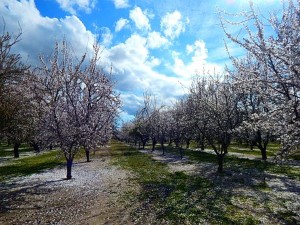He has for years sought to develop a thesis that would allow him to dismiss or taint the source so as not to be forced to acknowledge a positive role for something with a religious pedigree.
 Tel Aviv, January 31 – A local campaigner against the influence of religion on public life averted a crisis today by devising a line of reasoning that characterizes a minor Jewish holiday honoring trees as in fact a subversion of everything trees stand for and therefore another argument to do away with Jewish practice and thought, as opposed to something positive about Judaism.
Tel Aviv, January 31 – A local campaigner against the influence of religion on public life averted a crisis today by devising a line of reasoning that characterizes a minor Jewish holiday honoring trees as in fact a subversion of everything trees stand for and therefore another argument to do away with Jewish practice and thought, as opposed to something positive about Judaism.
Alon Kantran, 27, faced a potential conflict of values heading into the holiday, in line with his position that religion, Judaism in particular, has nothing positive to contribute to humanity and must be abolished or abandoned. The fifteenth of the Hebrew month of Shevat, cited by the ancient Mishnah text as “Rosh HaShanah LaIlanot,” the “New Year for Trees,” has become a celebration of trees, especially fruit trees, among Jews, and among the more secular, a day for planting trees and emphasizing ecological concerns. Such a constructive role for Jewish tradition threatened Mr. Kantran’s ethos, and he has for years sought to develop a thesis that would allow him to dismiss or taint the source so as not to be forced to acknowledge a positive role for something with a religious pedigree.
This year, reported the activist, he succeeded in formulating an argument he finds sufficiently compelling. “I’m happy, and a little relieved, I confess, to inform all concerned that I’ve done it,” he announced. “It goes like this: what Judaism actually celebrates on Tu Bishvat isn’t the beauty or symbolism of trees and nature, but human exploitation of trees and nature. It’s all about exploiting different varieties of produce to illustrate or symbolize something alien to the tree’s authentic experience, casting everything in human terms, regardless of the tree’s point of view or wishes.”
“I know all about the contention that trees want us to eat their fruit, but that’s all self-justifying nonsense,” he continued. “Have you ever noticed the reproductive processes of fruit trees are described in such conveniently anthropocentric terms? ‘Fruit,’ for example. As if its entire purpose is to be eaten. Well, I’m not buying it. Primarily because transactions are inherently exploitative, and property is theft, and humans are a stain on this ecosystem. Except enlightened humans such as me and my like-minded colleagues, not the backward, primitive, religious sort. Even though primitive is good – you just have to go ultra-primitive, like to prehistoric humanity or native tribes, who used to drive entire herds of buffalo off cliffs even if they didn’t need all of it. But don’t you dare accuse me of cultural appropriation for wishing to emulate them! As I said, this is about Tu Bishvat and how it’s terrible.”
Please support our work through Patreon.




